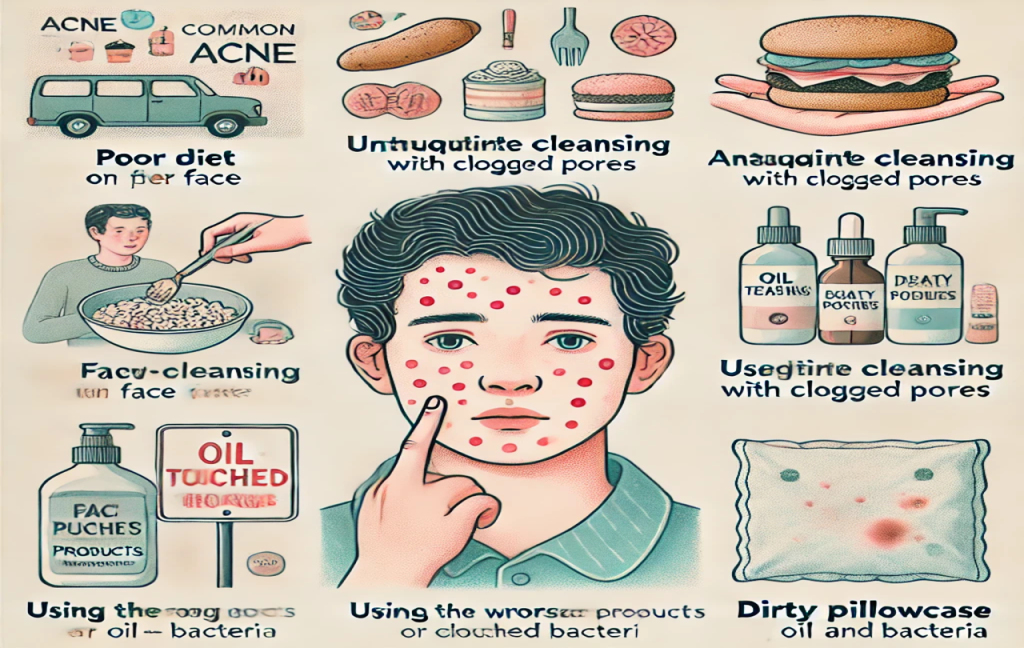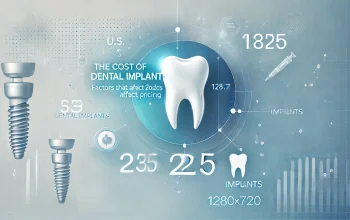5 Common Habits That Cause Acne on Your Face, Back, and Body: Dermatologist-Approved Tips for Clear Skin

Acne is a common skin condition that affects millions of people worldwide. While genetics and hormones play significant roles in acne development, certain daily habits can exacerbate the condition, leading to breakouts on your face, back, and body. Understanding these habits and making small changes can lead to clearer skin. Below, we discuss five bad habits that can cause acne, with insights and recommendations from dermatologists.
Table of Contents
1. Poor Diet Choices
Why It Causes Acne:
Your diet plays a crucial role in the health of your skin. Consuming high-glycemic foods, such as sugary snacks, white bread, and processed foods, can spike insulin levels, leading to increased oil production and inflammation—two major contributors to acne. Additionally, dairy products have been linked to acne in some individuals, possibly due to the hormones present in milk.
What the Experts Say:
Dr. Whitney Bowe, a board-certified dermatologist, explains that “high-glycemic diets increase insulin levels, which triggers a cascade of hormonal changes and inflammation, setting the stage for acne.” She recommends reducing the intake of sugary foods and focusing on a diet rich in whole grains, lean proteins, fruits, and vegetables.
How to Break the Habit:
- Opt for Low-Glycemic Foods: Incorporate more whole grains, vegetables, and legumes into your diet. These foods help maintain stable blood sugar levels, reducing the likelihood of acne flare-ups.
- Limit Dairy: If you suspect dairy may be contributing to your acne, try reducing or eliminating it from your diet for a few weeks and monitor your skin’s response.
2. Inadequate Cleansing Routine
Why It Causes Acne:
Skipping your cleansing routine or not cleansing properly can lead to the accumulation of dirt, oil, and dead skin cells on your skin’s surface, clogging pores and leading to breakouts. This is especially true for individuals who wear makeup or sweat frequently due to exercise.
What the Experts Say:
According to Dr. Ava Shamban, a dermatologist and author, “Cleansing is the cornerstone of good skincare, especially for those prone. Failing to cleanse properly can result in blocked pores, which are a breeding ground for acne-causing bacteria.”
How to Break the Habit:
- Cleanse Twice Daily: Use a gentle, non-comedogenic cleanser in the morning and before bed to remove impurities. If you exercise or sweat during the day, consider an additional cleanse.
- Remove Makeup Thoroughly: Always remove makeup before bed. Consider using micellar water or a makeup remover to ensure all traces of makeup are gone.
3. Touching Your Face Frequently
Why It Causes Acne:
Touching your face transfers bacteria, oils, and dirt from your hands to your skin, potentially leading to clogged pores. This habit is especially problematic for those who already have oily skin or are prone to breakouts.
What the Experts Say:
Dr. Joshua Zeichner, a dermatologist and director of cosmetic and clinical research in dermatology, warns that “unconscious face-touching can introduce acne-causing bacteria to the skin, exacerbating existing causing new breakouts.”
How to Break the Habit:
- Be Mindful: Become aware of how often you touch your face and consciously try to reduce it.
- Keep Hands Clean: Regularly wash your hands or use hand sanitizer, especially if you know you tend to touch your face frequently.
4. Using the Wrong Skincare Products
Why It Causes Acne:
Using skincare products that are too heavy, comedogenic, or not suitable for your skin type can lead to clogged pores and breakouts. For example, oil-based products can be too heavy for those with oily or acne-prone skin, leading to increased sebum production.
What the Experts Say:
Dr. Leslie Baumann, a board-certified dermatologist, states that “using the wrong skincare products can aggravate. Non-comedogenic products are a must for acne-prone skin to avoid pore clogging.”
How to Break the Habit:
- Choose Non-Comedogenic Products: Look for products labeled as non-comedogenic, oil-free, or suitable for acne-prone skin.
- Patch Test New Products: Before introducing a new product into your routine, patch test it on a small area of your skin to ensure it doesn’t cause a reaction or breakouts.
5. Not Changing Your Pillowcase Regularly
Why It Causes Acne:
Your pillowcase can accumulate oil, bacteria, and dead skin cells, which can be transferred back onto your skin while you sleep, leading to clogged pores and breakouts. This habit is often overlooked but can significantly impact, particularly on the face.
What the Experts Say:
Dr. Debra Jaliman, a dermatologist and author, emphasizes the importance of hygiene in preventing acne. She notes, “Your pillowcase should be changed regularly—ideally every few days—to prevent the buildup of bacteria and oils that can contribute to acne.”
How to Break the Habit:
- Change Pillowcases Frequently: Aim to change your pillowcase at least twice a week to minimize the transfer of oils and bacteria to your skin.
- Consider Silk Pillowcases: Silk pillowcases are less absorbent than cotton, which means they’re less likely to hold onto bacteria and oils that can cause acne.
Conclusion
Acne is a multifaceted condition, influenced by various factors, including lifestyle choices and daily habits. While some causes of acne may be beyond your control, such as genetics, you can manage and potentially reduce breakouts by addressing these five bad habits.
Adopting a balanced diet, maintaining a proper skincare routine, being mindful of face-touching, choosing the right skincare products, and practicing good hygiene with your pillowcases can make a significant difference in your skin’s health. For persistent or severe acne, it’s always best to consult with a dermatologist who can provide personalized advice and treatment options.
References:
- Dr. Whitney Bowe, board-certified dermatologist, and author of “The Beauty of Dirty Skin”
- Dr. Ava Shamban, dermatologist and author of “Heal Your Skin”
- Dr. Joshua Zeichner, dermatologist and director of cosmetic and clinical research in dermatology at Mount Sinai Hospital
- Dr. Leslie Baumann, board-certified dermatologist, and founder of the Baumann Cosmetic and Research Institute
- Dr. Debra Jaliman, dermatologist and author of “Skin Rules: Trade Secrets from a Top New York Dermatologist”
By recognizing and changing these habits, you can take control of your skin’s health and reduce the occurrence of acne on your face, back, and body. Clearer skin is often just a few habit changes away.
Free download acne formula pdf Dr Recommend




